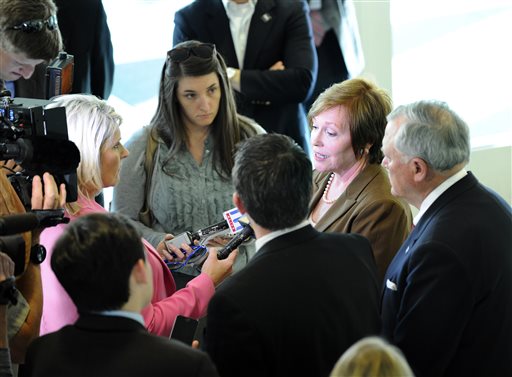 Brenda Fitzgerald, second from right, Georgia Department of Public Health commissioner, and Gov. Nathan Deal, right, respond to questions about Ebola victims under treatment at Emory University Hospital and stepped up efforts to screen for Ebola among travelers passing through Hartsfield-Jackson International Airport during the governor's visit to Georgia Tech Thursday, Oct. 16, 2014, in Atlanta. A joint emergency isolation unit administered by Emory University Hospital and the Centers for Disease Control and Prevention is currently treating two Ebola-stricken patients. (AP Photo/David Tulis)
Brenda Fitzgerald, second from right, Georgia Department of Public Health commissioner, and Gov. Nathan Deal, right, respond to questions about Ebola victims under treatment at Emory University Hospital and stepped up efforts to screen for Ebola among travelers passing through Hartsfield-Jackson International Airport during the governor's visit to Georgia Tech Thursday, Oct. 16, 2014, in Atlanta. A joint emergency isolation unit administered by Emory University Hospital and the Centers for Disease Control and Prevention is currently treating two Ebola-stricken patients. (AP Photo/David Tulis)CUMMING, Ga. (AP) - Since Georgia is home to one of five airports where people can arrive in the U.S. from countries affected by Ebola, the state's governor said Monday extra screening and precautions are necessary.
Gov. Nathan Deal said the guidelines drawn up by the state's Ebola response team are stringent but are less restrictive than those put in place by some other states, especially with regard to health care workers who return after treating Ebola patients.
"We're going to try to be as mindful of their privacy and their own necessity to move about but, by the same token, if they pose a potential threat to the health of the citizens of Georgia, we believe a quarantine would be appropriate," Deal told reporters after a campaign stop in Cumming, about 40 miles northeast of Atlanta.
The Department of Homeland Security last week designated Hartsfield-Jackson Atlanta International Airport as one of five airports in the country where passengers from Ebola-affected countries can arrive in the U.S., and where they would be subject to screening.
At the airport, quarantine station personnel will screen passengers arriving from the designated countries by checking their temperature, looking for symptoms and determining whether they have had contact with anyone infected by Ebola, the governor said.
Anyone who shows symptoms will be immediately taken to a designated hospital for evaluation. Those who show no symptoms will be divided into three categories for monitoring, Deal said. The incubation period for the disease is 21 days.
Travelers who are not health care workers but who have had direct contact with a person infected with Ebola will be considered high risk and will be placed in quarantine at a designated facility to be monitored.
Travelers who have been to an affected country but have had no known exposure to the disease will have to sign a monitoring agreement with the Georgia Department of Public Health. The agreement requires them to do temperature and symptom checks twice a day and to report results electronically or by phone. Failure to report will result in a mandatory quarantine order if necessary, Deal said.
Health care workers who have been treating Ebola patients but show no symptoms will be closely monitored by state health officials using video or home visits. Instead of quarantine in a designated facility, they are being trusted to monitor themselves and communicate closely with state health officials because their experience makes them better prepared to identify symptoms, Deal said. Those who don't comply will be quarantined in a state facility, he said.
"We believe that our policy will give them the freedom that they deserve and entrust them as health care workers to monitor and report if they have symptoms," Deal said, adding that restrictions on those health care workers can be modified as judged necessary by state health officials.
The governor is not worried about mandatory quarantines running afoul of the Constitution because governments are allowed to take certain steps if public health is at risk that they may not otherwise be able to take, he said.
